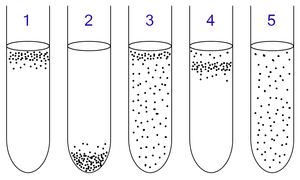An obligate aerobe is an organism that requires oxygen to grow. Through cellular respiration, these organisms use oxygen to metabolise substances, like sugars or fats, to obtain energy. In this type of respiration, oxygen serves as the terminal electron acceptor for the electron transport chain. Aerobic respiration has the advantage of yielding more energy (adenosine triphosphate or ATP) than fermentation or anaerobic respiration, but obligate aerobes are subject to high levels of oxidative stress.
Examples of obligately aerobic bacteria include Mycobacterium tuberculosis and Nocardia asteroides. With the exception of the yeasts, most fungi are obligate aerobes. Also, almost all algae are obligate aerobes.
See also

- Aerobic respiration
- Anaerobic respiration
- Fermentation
- Obligate anaerobe
- Facultative anaerobe
- Microaerophile
References






0 komentar :
Posting Komentar